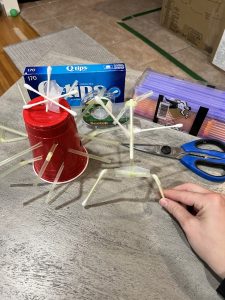Coding & Makerspace – Week 11
I have zero previous experience with both coding and makerspace. When we were given 20 minutes to explore the coding website a large part of me did not want to do it. I would not consider myself a strong science/math student and I assumed that is what it would be. I was surprised to see the game I chose was directed by in depth instructions. I found myself skimming the instructions and then having to return because I was trying to race through to the final product. The 20 minutes flew by and I did not finish. I was attempting to code the letters of my dog’s name to animate with her favourite objects, like a squirrel and tennis ball. I could see how a lot of students would really enjoy this type of programming, but for someone like myself I struggled with a few things. First this was so far out of my comfort zone I was immediately intimidated by the thought of coding. Second, the instructions were helpful, but I did not want to slow down, and I wanted to understand and be good at it right away, which I was not. Lastly, I am overall just not that interested in coding, but I can absolutely see certain students in my class loving these games.
Watching the Makerspaces Ted Talk I felt myself answering yes to a lot of speakers opening questions. Yes, I do wish I had access to tools and a workspace, I love DIY projects but most of the time it feels like I can’t start a project because I do not have the necessary tools to start it. If you look at the photo I took of my “creations”, you will notice green tape on the floor outlining the hypothetical kitchen island I want to build this winter break. That green tape has been on my floor for 4 months and we currently use two large, sturdy boxes as a pretend island. I think having a workshop filled with the tools needed for more complex woodworking projects would really interest me. I could see myself having a membership to a makerspace in my retirement. With a quick Google search, I was able to see a few options for makerspaces within Regina.

My Creations
The Science Center has a space for makerspace activities.
https://www.sasksciencecentre.com/makerspace-activities
CrashBang Labs offers memberships and includes a 3D printer and other similar parts.
https://saskatoon.makerfaire.com/maker/entry/179/
Angus Street Makerspace is another space open to kids that provide access to 3D printers and even sewing machines.
I was aware the Science Center offered different exhibits and programs in the world of creation, but other than that I had no idea these other businesses/locations existed. I think these spaces would offer excellent kids camps to get them involved in the making world.
The biggest obstacle holding me back from teaching about coding/makerspaces would be the subjects I currently teach, Health, Phys. Ed, and Life Transitions. I will not say it is impossible, but I think coding would be difficult to fit into health and Phys. Ed curriculum. Makerspace on the other hand is something I could incorporate to both my health classroom and classes in the gym. I do not necessarily agree that coding/makerspaces should be taught by “techies”, but it would help. As I mentioned before, the coding world does not overly interest me, and I think my students would know right away that I am not interested in what I am teaching. After reading Sandra Becker’s article my opinion changed slightly. She talked about making learning not feeling like an add on to teachers overflowing plates. I am worried it would feel like I am just trying to check the “maker” box. However, she began writing about observing learners in different light and this is where I see the greatest potential for my students. “Teachers must exemplify risk-taking. They must be willing to enter the makerspace in a state of not knowing. This is easier said than done”. This is something I need in my own practice. She later talks about teachers not needing to be the sole expert on the topics in the classroom. I am very comfortable being the knowledge keeper and distrubutor. As we continue to move into a technologically advanced world, my students are going to know more than me and I have to be ready to embrace that. I highly doubt I will spend my free time trying to understand the world’s most current technological advances, so why can’t I let my students do that hard work for me?
Have you let your students lead learning on topics or subjects you know little or nothing about?
How did that go for you? Were other students receptive to this learning?
Hi Nicole
I totally agree with you using coding is difficult in the classroom. I also have no experience in using coding in the classroom but I am also excited that we learn new things to use technology in the classroom for making teaching-learning effective and it also helps the students to develop problem-solving abilities and creative thinking. moreover, demand for technology is increasing continuously and it is very important teachers have the knowledge to use different types of technology in the classroom